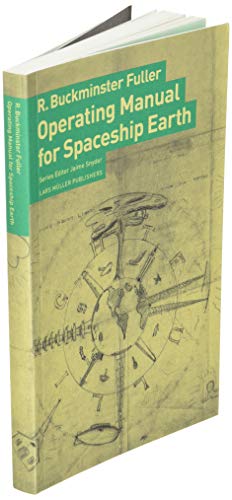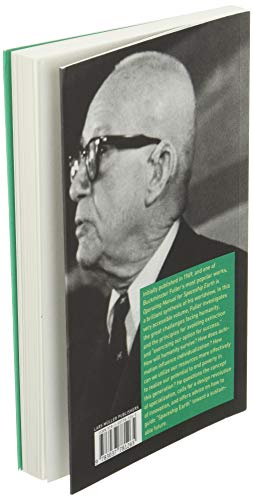Customer Services
Copyright © 2025 Desertcart Holdings Limited








Operating Manual for Spaceship Earth [Fuller, R. Buckminster] on desertcart.com. *FREE* shipping on qualifying offers. Operating Manual for Spaceship Earth Review: Essential Wisdom for Our Shared Journey - Essential Wisdom for Our Shared Journey A visionary classic that reminds us we are all crew members aboard one living planet. Fuller offers timeless insight into design, responsibility, and cooperation, urging humanity to live regeneratively and steward Earth with imagination and care. A must-read for anyone devoted to a sustainable and thriving future. Review: One of the most important books ever written. - Einstein once said that Buckminster Fuller was the smartest man he ever met. Bucky Fuller wrote this book and it should be read by every teacher, every CEO and actually every person on the planet. He explains things that you never learned in school. How we got to where we are right now and what we need to do to ensure that we are still here for hundreds of years to come.
| ASIN | 3037781262 |
| Best Sellers Rank | #171,329 in Books ( See Top 100 in Books ) #40 in Architectural Criticism #59 in Individual Architects & Firms #164 in Social Aspects of Technology |
| Customer Reviews | 4.7 4.7 out of 5 stars (455) |
| Dimensions | 4.75 x 0.5 x 7.5 inches |
| Edition | 1st |
| ISBN-10 | 0935754016 |
| ISBN-13 | 978-3037781265 |
| Item Weight | 2.31 pounds |
| Language | English |
| Print length | 152 pages |
| Publication date | July 15, 2008 |
| Publisher | Lars Müller Publishers |
J**R
Essential Wisdom for Our Shared Journey
Essential Wisdom for Our Shared Journey A visionary classic that reminds us we are all crew members aboard one living planet. Fuller offers timeless insight into design, responsibility, and cooperation, urging humanity to live regeneratively and steward Earth with imagination and care. A must-read for anyone devoted to a sustainable and thriving future.
D**O
One of the most important books ever written.
Einstein once said that Buckminster Fuller was the smartest man he ever met. Bucky Fuller wrote this book and it should be read by every teacher, every CEO and actually every person on the planet. He explains things that you never learned in school. How we got to where we are right now and what we need to do to ensure that we are still here for hundreds of years to come.
M**E
A Thinker's Delight
Ever feel like humanity is driving a high-performance vehicle without a clue where the owner's manual is? Buckminster Fuller found it. Reading "Operating Manual for Spaceship Earth" feels like discovering a secret, genius-level guide to our own planet that's been hiding in plain sight. Fuller’s core idea is simple but mind-bending: we are all crew members on Spaceship Earth, a miraculous vessel cruising through the universe. The problem? We've been acting like disorganized passengers, fighting over the snacks in the galley while ignoring the ship's control panel. He argues that we have the resources and the "know-how" to make this ship work for everyone, but we need to start thinking like a coordinated crew. This isn't a dry, academic book. It’s a passionate, urgent, and wildly optimistic call to action. Fuller writes with a unique, whirlwind energy, introducing brilliant concepts like "synergy" and "ephemeralization" (the art of doing more with less) that will fundamentally change how you see the world. If you're looking for a short book that will completely rewire your brain and fill you with a sense of purpose and possibility, this is it. It’s less of a book and more of an upgrade for your thinking. Highly recommended for any crew member looking to understand the ship a little better.
V**.
Absolutely unique. Timeless insights. More relevant today than ever.
This book presents the reader with a set of thinking tools for comprehensive problem-solving. Bucky Fuller asks the reader, "How big can we think?" and then proceeds to show exactly what he means in terms almost anyone can understand. Spaceship Earth provides a justification, based on Fuller's unique and compelling narrative of the history of western civilization, to reject specialization as harmful to the survival of our species. He reveals the great deception of shortages (energy, jobs, money) as a boldfaced lie by the world's most powerful interests (the "great pirates") and backs his assertion with compelling evidence. By putting boundaries on our thinking, e.g. the common prefaces to verbal expression we often hear, like "I'm not a lawyer," or "I'm not an engineer," that unfairly diminish the value of people's mental capacity to make moral judgments, we facilitate the "divide and conquer" strategy of the great pirates. Original thinkers do not always command attention. People tend to refer to them as "ahead of their time," or "impractical," or even "dishonest." Amazingly, Buckminster Fuller enjoyed the opposite during his lifetime. A master of many disciplines, he received no less than 41 honorary PhDs., yet described himself as a "non-conforming misfit" and was expelled from Harvard University, twice! The introduction is written by Fuller's grandson, Jamie Snyder, who lived and worked with Fuller for 28 years. He admits that Bucky's writing style can be complex due to his tendency to invent words and spin dynamic phrases when nothing else could express his thoughts. Snyder's suggestion is to just read through sections that are not immediately clear to get a sense of meaning, then after consideration, reread them. I found this technique very effective towards gaining an understanding Fuller's system-dynamical thinking style where it became complex in the later chapters. Spaceship Earth conveys a vital message for humanity. Do not leave solutions to those supposedly "in charge" (politicians). Fuller advocates empowering everyone, literally, in the activity of innovating ways to do more with less in order to save our planet from the insatiable drive to consume every single drop of oil, every fish in the sea, and every breath of fresh air, before it is too late. This book is suitable for all audiences, yet I think that young people may be especially able to embrace its message and integrate Fuller's concepts into their educational plans and life styles. If Amazon had a six-star category, this is the one book I'd place in it.
W**L
If ideas had weight then this thin book would be impossible to lift up
Very few people have the capacity to highlight our species interdependence on the environment in a simple way. Out of this selective group Buckminster Fuller is the best. In this book, which is a great starting point to understand Bucky's ideas, he guides us on an intellectual journey on the frame of mind needed to help us in the centuries ahead. Especially, with what our modern world calls climate change and technological progress. Bucky starts out by giving us his version of the great man theory of human development. Then he moves into our present world. Showing us how it developed and the great opportunities we have before us at this very moment and the very real power we have developed to wipe out all life. Bucky, however, is optimistic of our future. He says that we have the power to transform the world right now. With a bit of engineering and the right frame of mind we can re-design our world as if were were living on a spaceship. Where we have to look after everything, from cleaning our water and our air. Look after the sea and life forms that accompany us. Even looking after each other. In this book Bucky lays presents us with a plan that will solve a lot of the world current big problems. If ideas had weight then this thin book would be impossible to lift up
V**O
Ótimo livro. Uma visão holística do nosso planeta.
M**A
El autor va "construyendo", poco a poco, una idea de la humanidad, evolución, sinergia y "Nave Espacial Tierra". Al principio va como tanteando aquí y allí ciertos conceptos, enfocándose en una cosa en un momento, y cambiando de tema en otro. Al final, en los últimos capítulos, junta todo y expresa unas ideas muy interesantes sobre el futuro de la "nave espacial" tierra y la raza humana como su "tripulación", sobre ecología, educación, fronteras de países, igualdad racial, etc... Son ideas muy interesantes, que aún hoy consideraría "futuristas", pese a que el autor ya auguraba los cambios que propone para finales del siglo XX. El libro está en un inglés un tanto _denso_ (expresiones seguramente de la región del escritor), pero cualquiera con un nivel medio-alto de inglés podría atreverse con este libro.
B**Y
Operating manual for spaceship Earth is a practical explanation of how Earth interdependent systems work as a whole.
M**N
Inspiration og wisdom, how we can act different and use the synergitic and intuition for living and make wealth around the whole world
S**T
It got detailed view of world in the past but the size of the book and range of content doesn’t justify the cost
Trustpilot
5 days ago
1 month ago